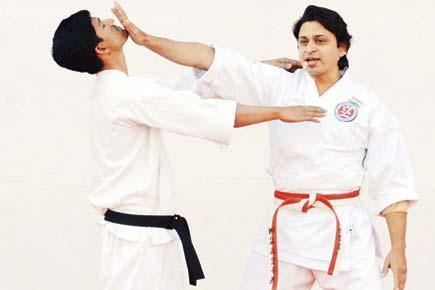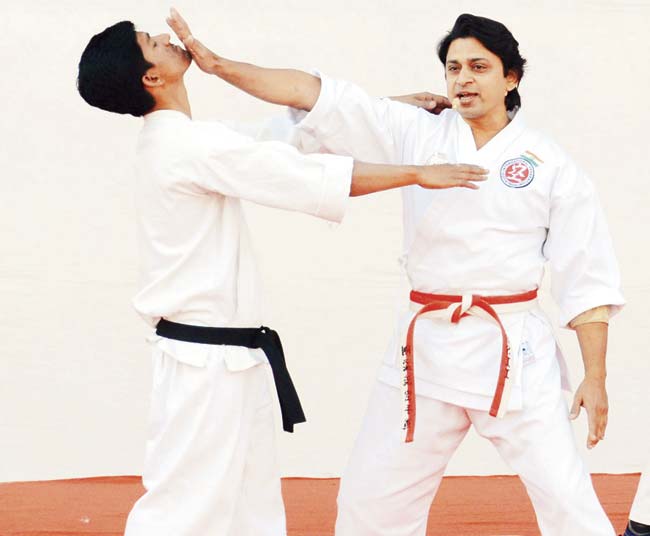A young woman says she was groped on a flight by an older man who put his hands between seats to touch her. She confronts him and then videos him as she questions his behaviour. He hides his face and mumbles his apologies

 A young woman says she was groped on a flight by an older man who put his hands between seats to touch her. She confronts him and then videos him as she questions his behaviour. He hides his face and mumbles his apologies. The young woman is unrelenting and does not give up. Later, off the flight, he apologises again for his “mistake”. He also says his daughter would forgive a man for doing what he had done. The airline says it is filing an FIR against the man.
A young woman says she was groped on a flight by an older man who put his hands between seats to touch her. She confronts him and then videos him as she questions his behaviour. He hides his face and mumbles his apologies. The young woman is unrelenting and does not give up. Later, off the flight, he apologises again for his “mistake”. He also says his daughter would forgive a man for doing what he had done. The airline says it is filing an FIR against the man.
ADVERTISEMENT

Martial arts exponent Vispi Kasad (right) leads a basic self-defence lesson at a Gujarat government event for women’s safety. Hopefully, the younger generation will speak out when they are attacked and break those old entrenched patterns of staying silent for a bit of peace. Pic/AFP
A cabbie in Mumbai touches a young female passenger inappropriately and then drives around in circles when she asks him to stop. He only stops at her college when she says she doesn’t have enough money to pay him. The cabbie is then taken to the police by the passenger’s friends.
Both are, in the general scheme of crimes against women, relatively small offences. Most often, many women would brush them off as being the price you pay for being a female out in public. But these two young women have, most thankfully, bucked that trend. They have refused to cow down and bow down to the notion that ‘men will be men’. They have refused to be ‘tolerant’, ‘forgiving’ and passively receptive of whatever is thrown their way.
As the first incident swept through social media, many comments on sites like reddit were about this much-needed tolerance. The woman had over-reacted, she should have just given the man the benefit of the doubt, where was the proof and so on. Others regretted that ‘the public’ always supported women at times like this instead of standing up for the poor hapless perpetrator. ‘Blame the victim’ is not just about asking what clothes a woman wore before she was raped. It is about questioning everything a woman does when she accuses a man of anything.
This is not to suggest that woman are always right (yes, I can hear husbands sighing) or that false cases are never filed against men. But research shows that these false cases make up a very small percentage of those filed. And research also shows that most women, whether faced with harassment or rape, will prefer to be tolerant and turn the other cheek. It is also true that most cases, no matter how heinous, are never taken up at all.
Even in a case as gruesome as the Delhi gangrape of 2012, questions were raised about women being out at night, women being out with men and all those other despicable ‘blame the victim’ arguments. Even after Tehelka founder and editor Tarun Tejpal wrote several verbose and florid letters of apologies to his colleague-victim, several questions were raised about her clothes, why she got into the lift with Tejpal and senior journalists also wrote existential pieces in defence of Tejpal based on “what the elevator saw”. In fact there was no camera in the lift in question and it is unclear whether the lift is a sentient being, but presumably “what the corridor outside the elevator saw” is a bit of a letdown as a headline.
These two young women though have bucked that trend of tolerant forgiveness. Unfortunately for the man on the plane, the social media is unforgiving in its spread and reach and whoever has seen the video have seen his face. This goes against the presumption of innocence principle on which Indian justice is based. But somewhere, perhaps, there might be a small smidgeon of a lesson for men who think sexual harassment of women is just a little fun pastime. It can boomerang in distressing ways. I can already see a look of bemusement on the faces of men who are neither like the man on the plane or the cabbie.
It is tempting to posit that because of the discussions on women’s rights recently, we are going to see an effective change in the way women are treated in society. But tempting as that is, it sounds over-ambitious. It is likely however that these two women were emboldened by recent events and therefore decided to create a ruckus. Hopefully, this younger generation of women will speak out when they are attacked and break those old entrenched patterns of staying silent for a bit of peace. All women will be grateful for that.
Ranjona Banerji is a senior journalist. You can follow her on twitter @ranjona
 Subscribe today by clicking the link and stay updated with the latest news!" Click here!
Subscribe today by clicking the link and stay updated with the latest news!" Click here!






